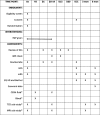Dexamethasone for adult patients with a symptomatic chronic subdural haematoma (Dex-CSDH) trial: study protocol for a randomised controlled trial
- PMID: 30514400
- PMCID: PMC6280536
- DOI: 10.1186/s13063-018-3050-4
Dexamethasone for adult patients with a symptomatic chronic subdural haematoma (Dex-CSDH) trial: study protocol for a randomised controlled trial
Erratum in
-
Correction to: Dexamethasone for adult patients with a symptomatic chronic subdural haematoma (Dex-CSDH) trial: study protocol for a randomised controlled trial.Trials. 2019 Mar 18;20(1):175. doi: 10.1186/s13063-019-3283-x. Trials. 2019. PMID: 30885268 Free PMC article.
Abstract
Background: Chronic subdural haematoma (CSDH) is a common neurosurgical condition, typically treated with surgical drainage of the haematoma. However, surgery is associated with mortality and morbidity, including up to 20% recurrence of the CSDH. Steroids, such as dexamethasone, have been identified as a potential therapy for reducing recurrence risk in surgically treated CSDHs. They have also been used as a conservative treatment option, thereby avoiding surgery altogether. The hypothesis of the Dex-CSDH trial is that a two-week course of dexamethasone in symptomatic patients with CSDH will lead to better functional outcome at six months. This is anticipated to occur through reduced number of hospital admissions and surgical interventions.
Methods: Dex-CSDH is a UK multi-centre, double-blind randomised controlled trial of dexamethasone versus placebo for symptomatic adult patients diagnosed with CSDH. A sample size of 750 patients has been determined, including an initial internal pilot phase of 100 patients to confirm recruitment feasibility. Patients must be recruited within 72 h of admission to a neurosurgical unit and exclusions include patients already on steroids or with steroid contraindications, patients who have a cerebrospinal fluid shunt and those with a history of psychosis. The decision regarding surgical intervention will be made by the clinical team and patients can be included in the trial regardless of whether operative treatment is planned or has been performed. The primary outcome measure is the modified Rankin Scale (mRS) at six months. Secondary outcomes include the number of CSDH-related surgical interventions during follow-up, length of hospital stay, mRS at three months, EQ-5D at three and six months, adverse events, mortality and a health-economic analysis.
Discussion: This multi-centre trial will provide high-quality evidence as to the effectiveness of dexamethasone in the treatment of CSDH. This has implications for patient morbidity and mortality as well as a potential economic impact on the overall health service burden from this condition.
Trial registration: ISRCTN, ISRCTN80782810 . Registered on 7 November 2014. EudraCT, 2014-004948-35 . Registered on 20 March 2015. Dex-CSDH trial protocol version 3, 27 Apr 2017. This protocol was developed in accordance with the SPIRIT checklist. Available as a separate document on request.
Keywords: Chronic subdural haematoma; Dexamethasone; Neurology; Neurosurgery; Randomised control trial.
Conflict of interest statement
Ethics approval and consent to participate
The Dex-CSDH trial protocol version 3, 27 Apr 2017, informed consent forms and all other relevant trial documents have been approved by North West-Haydock Research and Ethics Committee (REC), reference 15/NW/0171.
All correspondence with the REC will be retained in the Trial Master File and Investigator Site File. Annual reports will be submitted to the REC in accordance with national requirements. The trial will be performed in accordance with the SPIRIT guidelines and the letter of the declaration of Helsinki, the conditions and principles of GCP, the protocol and applicable local regulatory requirements and laws.
Protocol violations, deviations, non-compliances or breaches are departures from the approved protocol and must be adequately documented and reported to the Chief Investigator and Sponsor immediately. Any potential/suspected serious breaches of GCP must be reported immediately to the sponsor without any delay.
Consent for publication
The views expressed are those of the author(s) and not necessarily those of the NHS, the NIHR or the Department of Health and Social Care. The sponsors and funders reviewed the study design, management and analysis plan before approving the trial. Ownership of the data arising from this trial resides with the trial management group, who will decide on publication and authorship. On completion of the trial, the data will be analysed and tabulated and a final trial report will be prepared.
The Chancellor, Masters and Scholars of the University of Cambridge, The Old Schools, Trinity Lane, Cambridge CB2 1TN; and
Cambridge University Hospitals NHS Foundation Trust, Hills Road, Cambridge, CB2 0QQ.
Cambridge University Hospitals NHS Foundation Trust, as a member of the NHS Clinical Negligence Scheme for Trusts, will accept full financial liability for harm caused to patients in the clinical trial caused through the negligence of its employees and honorary contract holders. There are no specific arrangements for compensation should a patient be harmed through participation in the trial, but no-one has acted negligently. The University of Cambridge will arrange insurance for negligent harm caused as a result of protocol design and for non-negligent harm arising through participation in the clinical trial.
Competing interests
The authors declare that they have no competing interests.
Publisher’s Note
Springer Nature remains neutral with regard to jurisdictional claims in published maps and institutional affiliations.
Figures

References
-
- Berhauser Pont LM, Dammers R, Schouten JW, Lingsma HF, Dirven CM. Clinical factors associated with outcome in chronic subdural hematoma: a retrospective cohort study of patients on preoperative corticosteroid therapy. Neurosurgery. 2012;70(4):873–880. doi: 10.1227/NEU.0b013e31823672ad. - DOI - PubMed
Publication types
MeSH terms
Substances
Grants and funding
- II-C5-0715-20005/DH_/Department of Health/United Kingdom
- HTA/13/15/02/DH_/Department of Health/United Kingdom
- Research Professorship/National Institute for Health Research (GB)/International
- FS/12/8/29377/BHF_/British Heart Foundation/United Kingdom
- 13/15/02/Health Technology Assessment Programme/International
- NIHR-RP-R3-12-013/DH_/Department of Health/United Kingdom
- G0502030/MRC_/Medical Research Council/United Kingdom
- G9439390/MRC_/Medical Research Council/United Kingdom
- MC_UU_00002/3/MRC_/Medical Research Council/United Kingdom
- 13/15/02/DH_/Department of Health/United Kingdom
- G0601025/MRC_/Medical Research Council/United Kingdom
- G0600986/MRC_/Medical Research Council/United Kingdom
- RCS Rosetrees Research Fellowship/Royal College of Surgeons of England/International
- 12/35/57/DH_/Department of Health/United Kingdom
- FS/07/001/21990/BHF_/British Heart Foundation/United Kingdom
- G1002277/MRC_/Medical Research Council/United Kingdom
- FS/12/33/29561/BHF_/British Heart Foundation/United Kingdom
LinkOut - more resources
Full Text Sources
Medical
Miscellaneous

